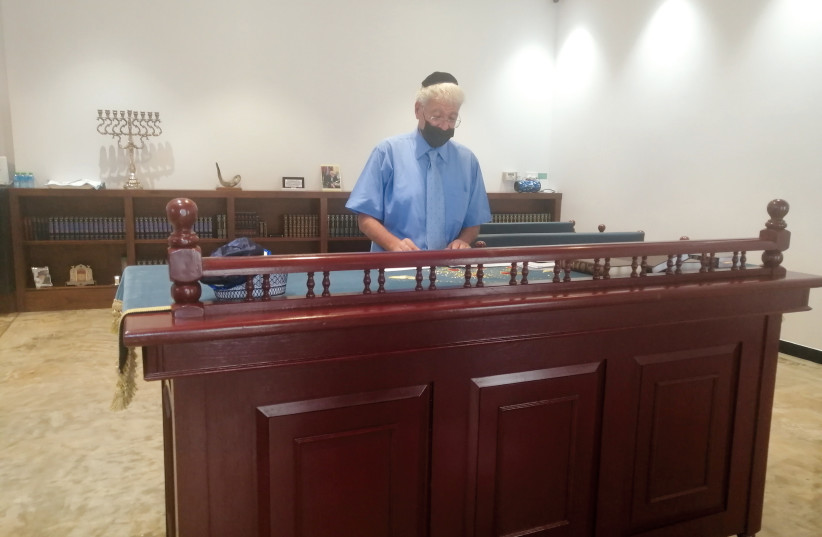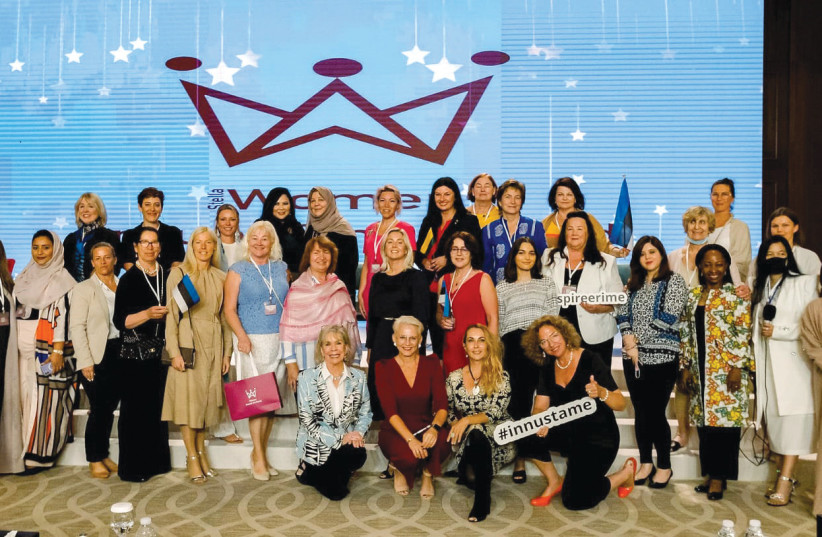September 13 last year started off as any other day for Ebrahim Dahood Nonoo, head of the tiny Jewish community in the Gulf Kingdom of Bahrain. He switched on the television set and settled down to watch the day’s news. But he was soon standing and stomping around in excitement. It had just been announced that Bahrain – home to his family for three generations – was making peace with Israel.
“It came out of the blue,” he exclaims, not having been privy to the behind-the-scenes negotiations. “We knew the United Arab Emirates was doing it and that was a huge step forward. And we were thinking, ‘Oh God, is it going to be us next?’ But we didn’t know.”
From then on it all happened very quickly. Two days later, delegations from Bahrain, the UAE, Israel and the US were inking the historic Abraham Accords at the White House. For the first time in 26 years, an Arab country, two in this case and the first from the Gulf, were recognizing the Jewish state and setting about normalizing diplomatic relations with her.
Later, two other Arab nations, Sudan and Morocco, followed suit, raising the number of Arab countries with formal diplomatic ties to Israel from two to six.
It was Nonoo’s namesake, his grandfather, who arrived with his uncle in the 33-island seaport in the early 1900s at the age of 12. Jews are recorded as having lived in the area since Talmudic times. Arabic sources also document Jewish life during the Islamic conquest in 630 CE.
Nonoo and I walk through the local souk (marketplace) where the cramped shops tumble onto cobbled pathways, selling everything from clothing to antiques.
“This is where commerce started in Bahrain,” Nonoo gesticulates while sipping dark Arabic coffee.
“There were three Khedouri brothers who arrived from Iraq en route to Hong Kong. One of them liked the place so much he stayed and became the wealthiest man in Bahrain at the time. There were also plenty of Jewish traders from Iraq. They had an edge because they were educated with contacts across Europe.”
It wasn’t long before Jews took over the market, so much so that on Saturdays it would close for Shabbat. Even the Christian and Muslim shop owners sealed their stores.
Nonoo points out where his grandfather used to sell spices before setting up Bahrain’s first money exchange business.

“How he started was ingenious. He used to gather all the discarded clothing and take the silver threads out of them. He’d then collect these together and use an acid process to turn them into silver bars which he’d sell abroad.”
We’ve now reached the synagogue which is inside the souk. For years it was the center of the community’s life and local Muslims would often join in religious ceremonies and visit the homes of their Jewish neighbors and friends.
“Bahrainis are known to respect all religions,” remarks Jewish Bahraini author, Nancy Khedouri. “Bahrain embraces all religions and everyone lives together with respect towards each other. In fact, the religious differences of the citizens of Bahrain has never been an obstacle to strong friendship bonds developing. Until today, even though many [Bahraini Jews] may have emigrated out of their own freewill, they are still remembered by their Bahraini friends and many continue to be in touch with each other.”
Often this is attributed to the country’s strategic location between the Qatari peninsula and the north eastern coast of Saudi Arabia. For generations traders from all over the world arrived here to live and work.
But things changed for the Jewish community in December 1947 when, in the wake of ongoing violence in Palestine, a mob of foreign port workers – mostly from Yemen, Egypt and Oman – looted Jewish homes and shops, destroyed the city’s synagogue, beat up the Rabbi and murdered an elderly Jewish woman in the capital, Manama.
“The Bahrainis had nothing to do with it,” stresses Nonoo. “Bahraini families actually protected the Jews. In all the years I’ve lived here, I’ve never once had a negative comment about the fact that I’m Jewish,” he says while showing me around the recently renovated synagogue. The wooden benches boast blue cushions and on the bima (podium) are religious books written in Arabic, English and Hebrew.
Two Torah scrolls were stolen during the riots. Only decades later did someone approach the community and offer to return them.
“We asked him why,” remembers Nonoo, “and he said that they’d had so much death, disease and illness in the family that they thought it was time to give it back.”
At its height, the community numbered some 1500 Jews but after the violence many emigrated to Israel. According to Bahraini law, they were not allowed to return. However, one man did after finding life in Israel difficult and was imprisoned for six months. He later remarked that it was worth it.
Nancy Khedouri expects the Abraham Accords to revitalize the tiny community that now numbers only 36 out of a population of 700 000. In August this year, the first bar mitzvah in 74 years was celebrated. Still, Khedouri doesn’t expect things to change significantly.

“We are now contacted much more by Jewish visitors, especially by those whose ancestors were living here, to trace back their roots. Many others tend to travel to the region on a short trip and wish to meet with the Jewish community to understand more about our rich history and to visit the synagogue,” she says.
Dr. Shaikh Khalid bin Khalifa Al Khalifa, chairman of the King Hamad Global Centre for Peaceful Coexistence in Manama, believes the normalization was late in coming.
“We really have to end this stagnation,” he says, smiling at me from under a traditional white cloth and black cord, his long white robe draping across the chair in his air conditioned office.
“There’s no way that we can continue living in a state where we are not really in a war with Israel and we are not at peace. This should have been done years ago especially as we in Bahrain have no enmity with Judaism as a religion. For us, the Christians, Jews and Muslims are one.”
Al Khalifa insists most Bahrainis support the Accords despite the sympathy many have for Palestinians who say they feel they’ve been betrayed by it.
Amina Leelo, CEO and founder of Stellapolare Boutique Events, isn’t so sure. While she agrees there are many who are happy about the deal, “there are still quite many who can’t digest it. They have been taught from childhood that Jews and Israel are not good. They cannot change their minds with a click.”
Leelo runs monthly webinars between Israeli and Bahraini women and recently hosted the second Stella Women Around the World conference where for the first time Israeli and Bahraini women met in the Kingdom’s capital.
“I hate this hatred between people. We need to expose different opinions and not just one-sided media. Education is the basis for everything. When people are exposed, they learn to challenge what they thought before. Direct flights between Manama and Tel Aviv [which begin at the end of September] will help people see with their own eyes. We have to be the change makers. Step by step we can change people’s minds.”
Itay Tagner, the first Israeli head of mission to Bahrain, knows firsthand the challenges this involves. But he says his role “is not to preach or to convince people, other than to open windows. Once you’ve opened a window, the wind blows both ways. Bahrainis can then be open to things that come from Israel and Israelis to things from Bahrain. The more we get to know each other, the less prejudice, fear and resentment there will be.”
Among the projects Tagner has spearhead since arriving in the Kingdom in January is a cooperation agreement between Israel’s national water company, Mekorot, and the Kingdom’s electricity and water authority, EWA ; a partnership between Israeli and Bahraini doctors and the sharing of Covid management and expertise.
“We have established, I would say, intimate communication between the two countries. A communication that has endured even a possible crisis regarding the last cycle of violence in Gaza.”
Tagner is in constant contact with Bahrain’s first ambassador to Israel, Khaled Yousif Al Jalahma, who just recently presented his credentials to President Isaac Herzog.
“We speak five times a day and we are pushing things from both ends,” he smiles. “We have one, single joint objective which is to better the relationship and to build what needs to be built. We see eye to eye and we operate hand to hand. One can almost think we only need one embassy.”
Reflecting on his time in Bahrain, he says, “I keep telling myself and others that I am privileged twice – one as an Israeli who is here at the right time and place, and also as the first and only Israeli that has a Bahraini identity card. I’m proud to call Bahrain my second home.”
